- Home
- Michael Swanwick
Slow Life
Slow Life Read online
Slow Life
Michael Swanwick
Michael Swanwick
Slow Life
Different evolutionary backgrounds lead to _very_ different perspectives.
"It was the Second Age of Space. Gagarin, Shepard, Glenn, and Armstrong were all dead. It was _our_ turn to make history now."
-- _The Memoirs of Lizzie O'Brien_
The raindrop began forming ninety kilometers above the surface of Titan. It started with an infinitesimal speck of tholin, adrift in the cold nitrogen atmosphere. Dianoacetylene condensed on the seed nucleus, molecule by molecule, until it was one shard of ice in a cloud of billions.
Now the journey could begin.
It took almost a year for the shard of ice in question to precipitate downward twenty-five kilometers, where the temperature dropped low enough that ethane began to condense on it. But when it did, growth was rapid.
Down it drifted.
At forty kilometers, it was for a time caught up in an ethane cloud. There it continued to grow. Occasionally it collided with another droplet and doubled in size. Finally it was too large to be held effortlessly aloft by the gentle stratospheric winds.
It fell.
Falling, it swept up methane and quickly grew large enough to achieve a terminal velocity of almost two meters per second.
At twenty-seven kilometers, it passed through a dense layer of methane clouds. It acquired more methane, and continued its downward flight.
As the air thickened, its velocity slowed and it began to lose some of its substance to evaporation. At two and a half kilometers, when it emerged from the last patchy clouds, it was losing mass so rapidly it could not normally be expected to reach the ground.
It was, however, falling toward the equatorial highlands, where mountains of ice rose a towering five hundred meters into the atmosphere. At two meters and a lazy new terminal velocity of one meter per second, it was only a breath away from hitting the surface.
Two hands swooped an open plastic collecting bag upward, and snared the raindrop.
"Gotcha!" Lizzie O'Brien cried gleefully.
She zip-locked the bag shut, held it up so her helmet cam could read the bar-code in the corner, and said, "One raindrop." Then she popped it into her collecting box.
Sometimes it's the little things that make you happiest. Somebody would spend a _year_ studying this one little raindrop when Lizzie got it home. And it was just Bag 64 in Collecting Case 5. She was going to be on the surface of Titan long enough to scoop up the raw material of a revolution in planetary science. The thought of it filled her with joy.
Lizzie dogged down the lid of the collecting box and began to skip across the granite-hard ice, splashing the puddles and dragging the boot of her atmosphere suit through the rivulets of methane pouring down the mountainside._ "I'm sing-ing in the rain."_ She threw out her arms and spun around. _"Just sing-ing in the rain!"_
"Uh ... O'Brien?" Alan Greene said from the _Clement_. "Are you all right?"
_"Dum-dee-dum-dee-dee-dum-dum, I'm ... some-thing again."_
"Oh, leave her alone." Consuelo Hong said with sour good humor. She was down on the plains, where the methane simply boiled into the air, and the ground was covered with thick, gooey tholin. It was, she had told them, like wading ankle-deep in molasses. "Can't you recognize the scientific method when you hear it?"
"If you say so," Alan said dubiously. He was stuck in the _Clement_, overseeing the expedition and minding the website. It was a comfortable gig -- _he_ wouldn't be sleeping in his suit _or_ surviving on recycled water and energy stix -- and he didn't think the others knew how much he hated it.
"What's next on the schedule?" Lizzie asked.
"Um ... well, there's still the robot turbot to be released. How's that going, Hong?"
"Making good time. I oughta reach the sea in a couple of hours."
"Okay, then it's time O'Brien rejoined you at the lander. O'Brien, start spreading out the balloon and going over the harness checklist."
"Roger that."
"And while you're doing that, I've got today's voice- posts from the Web cued up."
Lizzie groaned, and Consuelo blew a raspberry. By NAFTASA policy, the ground crew participated in all webcasts. Officially, they were delighted to share their experiences with the public. But the VoiceWeb (privately, Lizzie thought of it as the Illiternet) made them accessible to people who lacked even the minimal intellectual skills needed to handle a keyboard.
"Let me remind you that we're on open circuit here, so anything you say will go into my reply. You're certainly welcome to chime in at any time. But each question-and- response is transmitted as one take, so if you flub a line, we'll have to go back to the beginning and start all over again."
"Yeah, yeah," Consuelo grumbled.
"We've done this before," Lizzie reminded him.
"Okay. Here's the first one."
_"Uh, hi, this is BladeNinja43. I was wondering just what it is that you guys are hoping to discover out there."_
"That's an extremely good question," Alan lied. "And the answer is: We don't know! This is a voyage of discovery, and we're engaged in what's called 'pure science.' Now, time and time again, the purest research has turned out to be extremely profitable. But we're not looking that far ahead. We're just hoping to find something absolutely unexpected."
"My God, you're slick," Lizzie marveled.
"I'm going to edit that from the tape," Alan said cheerily. "Next up."
_"This is Mary Schroeder, from the United States. I teach high school English, and I wanted to know for my students, what kind of grades the three of you had when you were their age."_
Alan began. "I was an overachiever, I'm afraid. In my sophomore year, first semester, I got a B in Chemistry and panicked. I thought it was the end of the world. But then I dropped a couple of extracurriculars, knuckled down, and brought that grade right up."
"I was good in everything but French Lit," Consuelo said.
"I nearly flunked out!" Lizzie said. "Everything was difficult for me. But then I decided I wanted to be an astronaut, and it all clicked into place. I realized that, hey, it's just hard work. And now, well, here I am."
"That's good. Thanks, guys. Here's the third, from Maria Vasquez."
_"Is there life on Titan?"_
"Probably not. It's _cold_ down there! 94 degrees Kelvin is the same as -179 degrees Celsius, or -290 degrees Fahrenheit. And yet ... life is persistent. It's been found in Antarctic ice and in boiling water in submarine volcanic vents. Which is why we'll be paying particular attention to exploring the depths of the ethane-methane sea. If life is anywhere to be found, that's where we'll find it."
"Chemically, the conditions here resemble the anoxic atmosphere on Earth in which life first arose," Consuelo said. "Further, we believe that such prebiotic chemistry has been going on here for four and a half billion years. For an organic chemist like me, it's the best toy box in the Universe. But that lack of heat is a problem. Chemical reactions that occur quickly back home would take thousands of years here. It's hard to see how life could arise under such a handicap."
"It would have to be slow life," Lizzie said thoughtfully. "Something vegetative. 'Vaster than empires and more slow.' It would take millions of years to reach maturity. A single thought might require centuries...."
"Thank you for that, uh, wild scenario!" Alan said quickly. Their NAFTASA masters frowned on speculation. It was, in their estimation, almost as unprofessional as heroism. "This next question comes from Danny in Toronto."
_"Hey, man, I gotta say I really envy you being in that tiny little ship with those two hot babes."_
Alan laughed lightly. "Yes, Ms. Hong and Ms. O'Brien are certainly attractive women. But we're kept so busy that, believe it or n
ot, the thought of sex never comes up. And currently, while I tend to the _Clement_, they're both on the surface of Titan at the bottom of an atmosphere 60 percent more dense than Earth's, and encased in armored exploration suits. So even if I did have inappropriate thoughts, there's no way we could -- "
"Hey, Alan," Lizzie said. "Tell me something."
"Yes?"
"What are you wearing?"
"Uh ... switching over to private channel."
"Make that a three-way," Consuelo said.
* * *
Ballooning, Lizzie decided, was the best way there was of getting around. Moving with the gentle winds, there was no sound at all. And the view was great!
People talked a lot about the "murky orange atmosphere" of Titan, but your eyes adjusted. Turn up the gain on your helmet, and the white mountains of ice were _dazzling!_ The methane streams carved cryptic runes into the heights. Then, at the tholin-line, white turned to a rich palette of oranges, reds, and yellows. There was a lot going on down there -- more than she'd be able to learn in a hundred visits.
The plains were superficially duller, but they had their charms as well. Sure, the atmosphere was so dense that refracted light made the horizon curve upward to either side. But you got used to it. The black swirls and cryptic red tracery of unknown processes on the land below never grew tiring.
On the horizon, she saw the dark arm of Titan's narrow sea. If that was what it was. Lake Erie was larger, but the spin doctors back home had argued that since Titan was so much smaller than Earth, _relatively_ it qualified as a sea. Lizzie had her own opinion, but she knew when to keep her mouth shut.
Consuelo was there now. Lizzie switched her visor over to the live feed. Time to catch the show.
* * *
"I can't believe I'm finally here," Consuelo said. She let the shrink-wrapped fish slide from her shoulder down to the ground. "Five kilometers doesn't seem like very far when you're coming down from orbit -- just enough to leave a margin for error so the lander doesn't come down in the sea. But when you have to _walk_ that distance, through tarry, sticky tholin ... well, it's one heck of a slog."
"Consuelo, can you tell us what it's like there?" Alan asked.
"I'm crossing the beach. Now I'm at the edge of the sea." She knelt, dipped a hand into it. "It's got the consistency of a Slushy. Are you familiar with that drink? Lots of shaved ice sort of half-melted in a cup with flavored syrup. What we've got here is almost certainly a methane-ammonia mix; we'll know for sure after we get a sample to a laboratory. Here's an early indicator, though. It's dissolving the tholin off my glove." She stood.
"Can you describe the beach?"
"Yeah. It's white. Granular. I can kick it with my boot. Ice sand for sure. Do you want me to collect samples first or release the fish?"
"Release the fish," Lizzie said, almost simultaneously with Alan's "Your call."
"Okay, then." Consuelo carefully cleaned both of her suit's gloves in the sea, then seized the shrink-wrap's zip tab and yanked. The plastic parted. Awkwardly, she straddled the fish, lifted it by the two side-handles, and walked it into the dark slush.
"Okay, I'm standing in the sea now. It's up to my ankles. Now it's at my knees. I think it's deep enough here."
She set the fish down. "Now I'm turning it on."
The Mitsubishi turbot wriggled, as if alive. With one fluid motion, it surged forward, plunged, and was gone.
Lizzie switched over to the fishcam.
* * *
Black liquid flashed past the turbot's infrared eyes. Straight away from the shore it swam, seeing nothing but flecks of paraffin, ice, and other suspended particulates as they loomed up before it and were swept away in the violence of its wake. A hundred meters out, it bounced a pulse of radar off the sea floor, then dove, seeking the depths.
Rocking gently in her balloon harness, Lizzie yawned.
Snazzy Japanese cybernetics took in a minute sample of the ammonia-water, fed it through a deftly constructed internal laboratory, and excreted the waste products behind it. "We're at twenty meters now," Consuelo said. "Time to collect a second sample."
The turbot was equipped to run hundreds of on-the- spot analyses. But it had only enough space for twenty permanent samples to be carried back home. The first sample had been nibbled from the surface slush. Now it twisted, and gulped down five drams of sea fluid in all its glorious impurity. To Lizzie, this was science on the hoof. Not very dramatic, admittedly, but intensely exciting.
She yawned again.
"O'Brien?" Alan said, "How long has it been since you last slept?"
"Huh? Oh ... twenty hours? Don't worry about me, I'm fine."
"Go to sleep. That's an order."
"But -- "
"Now."
Fortunately, the suit was comfortable enough to sleep in. It had been designed so she could.
First she drew in her arms from the suit's sleeves. Then she brought in her legs, tucked them up under her chin, and wrapped her arms around them. "'Night, guys," she said.
_"Buenas noches, querida,"_ Consuelo said,_ "que tengas lindos suenyos."_
"Sleep tight, space explorer."
* * *
The darkness when she closed her eyes was so absolute it crawled. Black, black, black. Phantom lights moved within the darkness, formed lines, shifted away when she tried to see them. They were as fugitive as fish, luminescent, fainter than faint, there and with a flick of her attention fled.
A school of little thoughts flashed through her mind, silver-scaled and gone.
Low, deep, slower than sound, something tolled. The bell from a drowned clock tower patiently stroking midnight. She was beginning to get her bearings. Down _there_ was where the ground must be. Flowers grew there unseen. Up above was where the sky would be, if there were a sky. Flowers floated there as well.
Deep within the submerged city, she found herself overcome by an enormous and placid sense of self. A swarm of unfamiliar sensations washed through her mind, and then...
"Are you me?" a gentle voice asked.
"No," she said carefully. "I don't think so."
Vast astonishment. "You think you are not me?"
"Yes. I think so, anyway."
"Why?"
There didn't seem to be any proper response to that, so she went back to the beginning of the conversation and ran through it again, trying to bring it to another conclusion. Only to bump against that "Why?" once again.
"I don't know why," she said.
"Why not?"
"I don't know."
She looped through that same dream over and over again all the while that she slept.
* * *
When she awoke, it was raining again. This time, it was a drizzle of pure methane from the lower cloud deck at fifteen kilometers. These clouds were (the theory went) methane condensate from the wet air swept up from the sea. They fell on the mountains and washed them clean of tholin. It was the methane that eroded and shaped the ice, carving gullies and caves.
Titan had more kinds of rain than anywhere else in the Solar System.
The sea had crept closer while Lizzie slept. It now curled up to the horizon on either side like an enormous dark smile. Almost time now for her to begin her descent. While she checked her harness settings, she flicked on telemetry to see what the others were up to.
The robot turbot was still spiraling its way downward, through the lightless sea, seeking its distant floor. Consuelo was trudging through the tholin again, retracing her five-kilometer trek from the lander _Harry Stubbs_, and Alan was answering another set of webposts.
_"Modelos de la evolucion de Titanes indican que la luna formo de una nube circumplanetaria rica en amoniaco y metano, la cual al condensarse dio forma a Saturno asi como a otros satelites. Bajo estas condiciones en -- "_
"Uh ... guys?"
Alan stopped. "Damn it, O'Brien, now I've got to start all over again."
"Welcome back to the land of the living," Consuelo said. "You should check out
the readings we're getting from the robofish. Lots of long-chain polymers, odd fractions ... tons of interesting stuff."
"Guys?"
This time her tone of voice registered with Alan. "What is it, O'Brien?"
"I think my harness is jammed."
* * *
Lizzie had never dreamed disaster could be such drudgery. First there were hours of back- and-forth with the NAFTASA engineers. What's the status of rope 14? Try tugging on rope 8. What do the D-rings look like? It was slow work because of the lag time for messages to be relayed to Earth and back. And Alan insisted on filling the silence with posts from the VoiceWeb. Her plight had gone global in minutes, and every unemployable loser on the planet had to log in with suggestions.
_"Thezgemoth337, here. It seems to me that if you had a gun and shot up through the balloon, it would maybe deflate and then you could get down."_
"I don't have a gun, shooting a hole in the balloon would cause it not to deflate but to rupture, I'm 800 hundred meters above the surface, there's a sea below me, and I'm in a suit that's not equipped for swimming. Next."
_"If you had a really big knife -- "_
"Cut! Jesus, Greene, is this the best you can find? Have you heard back from the organic chem guys yet?"
"Their preliminary analysis just came in," Alan said. "As best they can guess -- and I'm cutting through a lot of clutter here -- the rain you went through wasn't pure methane."
"No shit, Sherlock."
"They're assuming that whitish deposit you found on the rings and ropes is your culprit. They can't agree on what it is, but they think it underwent a chemical reaction with the material of your balloon and sealed the rip panel shut."
"I thought this was supposed to be a pretty nonreactive environment."
"It is. But your balloon runs off your suit's waste heat. The air in it is several degrees above the melting- point of ice. That's the equivalent of a blast furnace, here on Titan. Enough energy to run any number of amazing reactions. You haven't stopped tugging on the vent rope?"
"I'm tugging away right now. When one arm gets sore, I switch arms."

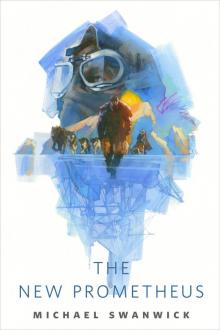 The New Prometheus
The New Prometheus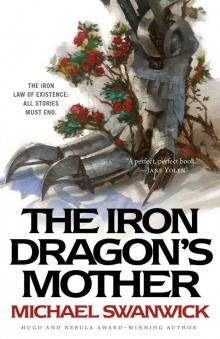 The Iron Dragon’s Mother
The Iron Dragon’s Mother The Mongolian Wizard Stories
The Mongolian Wizard Stories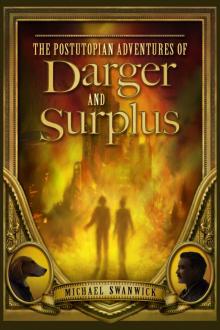 The Postutopian Adventures of Darger and Surplus
The Postutopian Adventures of Darger and Surplus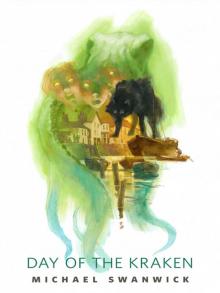 Day of the Kraken
Day of the Kraken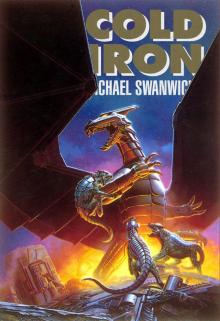 Cold Iron
Cold Iron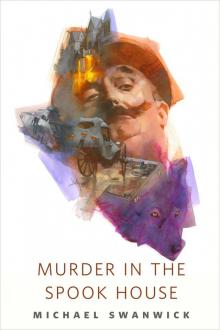 Murder in the Spook House: A Tor.com Original
Murder in the Spook House: A Tor.com Original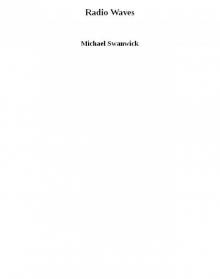 Radio Waves
Radio Waves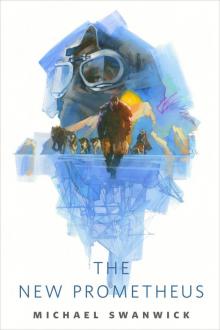 The New Prometheus: A Tor.com Original
The New Prometheus: A Tor.com Original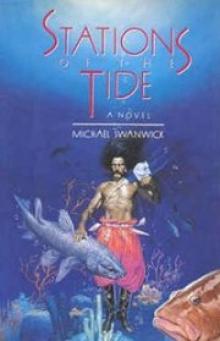 Stations of the Tide
Stations of the Tide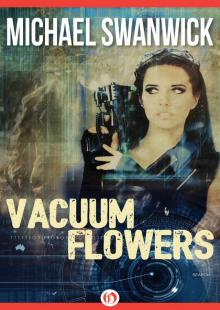 Vacuum Flowers
Vacuum Flowers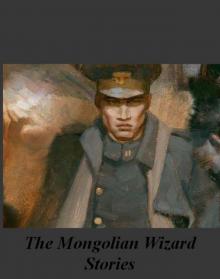 The Mongolian Wizard Stories (online stories 1-7)
The Mongolian Wizard Stories (online stories 1-7)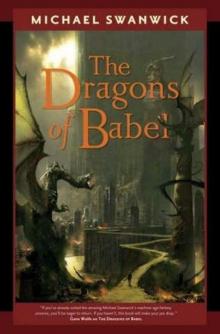 The Dragons of Babel
The Dragons of Babel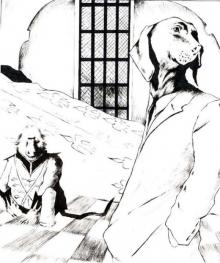 The Dog Said Bow-Wow
The Dog Said Bow-Wow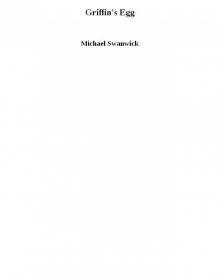 Griffin's Egg
Griffin's Egg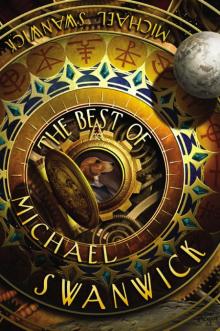 The Best of Michael Swanwick
The Best of Michael Swanwick Not So Much, Said the Cat
Not So Much, Said the Cat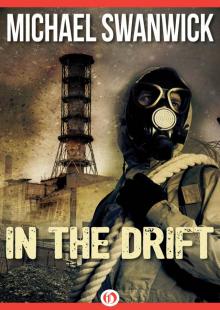 In the Drift
In the Drift Vacumn Flowers
Vacumn Flowers Slow Life
Slow Life The Wisdom Of Old Earth
The Wisdom Of Old Earth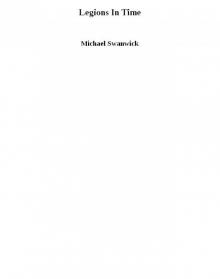 Legions In Time
Legions In Time Scherzo with Tyrannosaur
Scherzo with Tyrannosaur The Year's Best Science Fiction (2008 Edition)
The Year's Best Science Fiction (2008 Edition)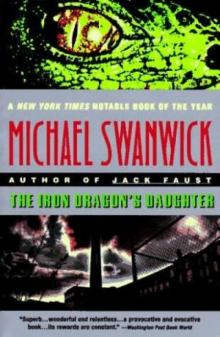 The Iron Dragon's Daughter
The Iron Dragon's Daughter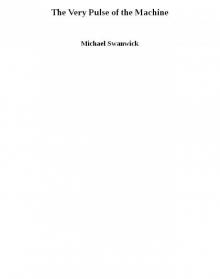 The Very Pulse of the Machine
The Very Pulse of the Machine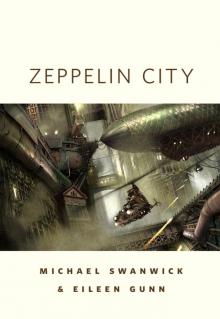 Zeppelin City
Zeppelin City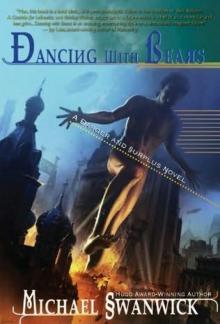 Dancing with Bears
Dancing with Bears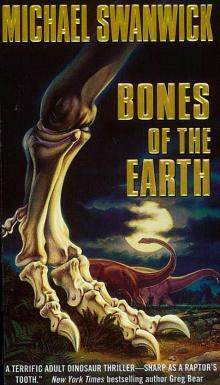 Bones of the Earth
Bones of the Earth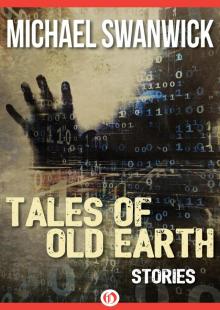 Tales of Old Earth
Tales of Old Earth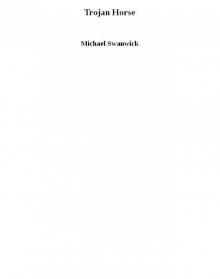 Trojan Horse
Trojan Horse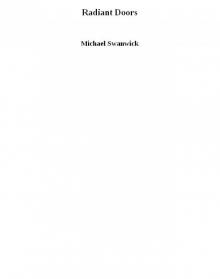 Radiant Doors
Radiant Doors